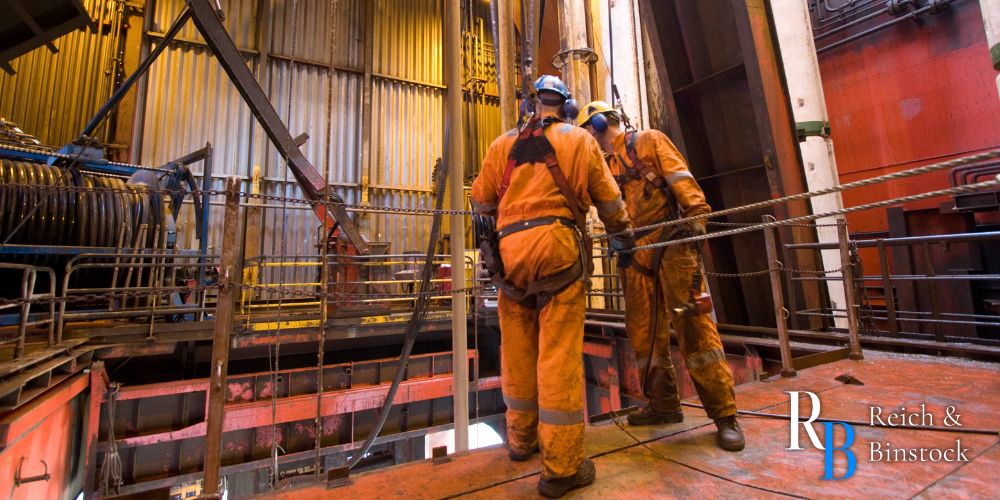Oil rig workers have some of the most dangerous jobs in the nation. Due to the nature of their job responsibilities, they face the risk of serious injuries every single day. Oil rig injuries can range from relatively mild, to severe, to deadly. Anyone injured in an oil rig accident caused by someone else’s negligence deserves compensation for their injuries. If you were injured on an offshore rig or onshore rig, contact a Houston oil rig injury lawyer with Reich & Binstock.
At Reich & Binstock, we have decades of experience representing injured oil and gas workers after they suffer serious injuries. We also represent families who have lost loved ones in oil field accidents. Whether you suffered back injuries, head injuries, or complications from toxic chemicals, our firm has the experience you need for your case. To schedule a free consultation with us, please call our office at 713-622-7271 today.
What Is an Oil Rig?
An oil rig is a large structure that has facilities and equipment for extracting and processing oil and natural gas from the ground. They are essential to the oil and gas industry. There are several different types of oil rigs, including the following.
- Offshore drilling rigs
- Onshore oil rigs
- Floating oil rigs
- Drillships
- Semi-submersibles
- Jack-up rig
- Drilling barges
- Spar platforms
- Tension-leg platforms (TLPs)
- Compliant towers
- Condeep platforms
- Fixed platforms
- Normally unmanned installations (NUIs)
Each onshore and offshore oil rig is fitted with important oil rig equipment that allows for the extraction of oil and gas. These structures are usually very large, very tall, and manned by oil and gas workers with specialized training.
Is It Dangerous to Work on an Oil Rig?
Yes. Many aspects of working on oil rigs make them highly dangerous, and oil rig deaths are unfortunately more common than you might think. Even though rigs have numerous safety procedures in place, certain parties could become lax in following those procedures. Failing to follow all safety precautions is a recipe for disaster when paired with the dangerous conditions of oil rig jobs.
Some elements that make oil rigs so dangerous include slippery surfaces, heavy machinery, electrical equipment, flammable oil and gas, and much more. When everyone, including technicians, mechanics, oil rig operators, and other workers follow all proper safety measures, most oil rig accidents are preventable.
However, when someone is negligent in following safety protocols, this is when accidents become more likely. After oil rig accidents occur, injured victims should contact a skilled personal injury attorney to seek compensation for their injuries.
What Are the Types of Oil Rig Accidents?

The most common types of oil rig accidents include the following.
- Fires and explosions
- Slip and fall accidents
- Toxic chemical leaks
- Drilling blowouts
- Equipment malfunctions
- Electrocutions
- Oil or gas leaks
- Falling objects
- Falling from a higher level
- Hydraulic machinery malfunctions
- Breaks or snapbacks of lines
- Motor vehicle, boating, or helicopter accidents while commuting to the job site
Remember that many of these oil field accidents can be prevented by following all proper safety measures. Unfortunately, even if one person does their job as safely as possible, they cannot control the actions of other people. Another’s negligent mistake could easily lead to serious injury on an oil rig, or even death.
Common Causes of Oil Rig Accidents
Some of the most common causes of oil rig accidents are fires, explosions, poor training, defective equipment or machinery, slick surfaces, and falling objects.
The heavy machinery used on oil rigs is often complicated and extremely powerful. If this equipment is not properly maintained, malfunctions and equipment failures can occur. Oil companies and other parties are responsible for maintaining the health and safety of the rig’s equipment, as per the Occupational Safety and Health Administration regulations.
It’s no surprise that crude oil and natural gas are extremely flammable substances. What many people fail to realize is that there are many sources of ignition on an oil rig. Examples of equipment that could ignite flammable substances include open flames, commercial lighting, electricity, and welding tools. Even a small cigarette is enough to ignite these combustible materials and cause a fire or explosion.
Proper training is necessary to ensure that each and every oil rig employee does their job as safely as possible. If workers and contractors do not receive proper training, they may operate certain equipment improperly and cause an accident or injure themselves.
Lastly, workers must wear the proper protective gear to protect themselves from things like falling objects, eye injuries, head trauma, chemical burns, and hazardous materials. Failing to wear or provide safety gear could result in an injury in an accident that wouldn’t have happened with the proper equipment.
How Frequent Are Deaths on Oil Rigs?
Working in the oil and gas industry, especially on oil rigs, can be inherently dangerous. This is a large part of why these jobs are so lucrative. While oil rig deaths are not nearly as common as injuries, they still happen. According to data from the Center for Public Integrity, 1,566 oil and gas industry workers died during the course of their jobs from 2008 through 2017.
When these dangerous jobs lead to worker deaths, the surviving family members of those workers may have the right to file a wrongful death lawsuit against the liable parties. Family members who have lost a loved one in an oil rig accident should contact a Houston wrongful death lawyer as soon as possible to discuss their case.
Most Common Oil Rig Injuries

The most common injuries that onshore and offshore oil rig workers face are often worse than those in other occupations. This is simply due to the nature of the work environment. Below, we outline the most common oil rig injuries that workers sustain on the job.
Burn Injuries
Everybody knows that oil and gas are highly combustible materials. When fires and explosions happen, this can lead to severe burns for workers. Rigs also tend to keep certain chemical solvents on hand for their work, meaning workers could also potentially suffer chemical burns.
Accidental Amputation
The most common amputation accident occurs when fingers get caught in heavy equipment. As we said before, oil rig equipment is heavy, complex, and powerful. A lapse in attention could mean the difference between keeping all ten fingers and losing one, two, or more.
Bone Fractures
Fractured bones are another common injury in the oil industry. The most commonly broken bones are those in the legs. Fractures can occur from a number of oil rig accidents, including falls, explosions, contact with heavy equipment, and more.
Head Injuries
Head trauma is also common in oil rig accident cases. Injuries to the head, such as cuts and lacerations, concussions, and traumatic brain injuries (TBIs), can occur from many different accidents. Examples include fall accidents, explosions, and contact with equipment.
Workers who suffer TBIs should contact a Houston brain injury attorney about their case. An attorney can evaluate their claim and advise them on how to proceed.
Back and Spinal Cord Injuries
Back injuries and spinal cord injuries are common, often debilitating injuries that oilfield workers can suffer. The most serious of these injuries could even lead to partial or total paralysis.
Workers who suffer these types of oil rig injuries should contact a Houston spinal cord injury attorney as soon as possible about their case.
Hearing Loss
Hearing loss is one of the most common explosion injuries, but it can also result from repeated exposure to loud drilling equipment. Workers who suffer permanent hearing loss on the job could file a claim for partial or complete hearing loss.
Eye and Facial Injuries
Eye injuries and facial injuries are common occurrences when someone misuses the strong chemicals kept on oil rigs. Many of those chemicals are highly corrosive and harmful to the skin. Getting them on one’s face and eyes can cause scarring and permanent damage to the eyes and vision.
Toxic Chemical Exposure
Exposure to toxic chemicals is also possible on oil rigs. Hydrogen sulfide is one such chemical that has taken its toll on many oil rig employees. The gas is colorless but with a strong odor. If an area of a rig has inadequate ventilation, toxic gasses can collect and harm a worker’s nervous system. It could even kill them if they remain in the gas for too long.
Hydrogen sulfide is also highly combustible, which means a concentration of it could cause an explosion if ignited.
Getting Compensation After Oil Rig Accidents

Employees who are injured in oil rig jobs have the right to pursue compensation from the negligence parties that contributed to the accident. If you are eligible to file an oilfield injury lawsuit, you could receive the following forms of compensation.
- Lost wages
- Lost benefits
- Medical costs
- Pain and suffering
- Loss of enjoyment of life
- Scarring or disfigurement
If the accident resulted in the worker’s death, their surviving family members could file a wrongful death claim. In these claims, the family can pursue compensation for funeral and burial costs, as well as medical bills and other accident-related costs.
Why You Should Hire an Oil Field Injury Attorney
Immediately following your oil rig accident, you must file an accident report with your employer. This will automatically trigger an investigation into the cause of the accident. Both your employer and your insurance company have a vested interest in ensuring your compensation is as low as possible. With the influence and money they have on their side, it can feel almost impossible to file a claim against them without legal representation.
If you receive a call from an insurance adjuster after the accident, we strongly recommend that you direct them to your legal team. It is not a good idea to speak with the insurance company without your attorney present. They will record everything you say and use your own words against you if possible. Your attorney will keep this from happening.
Contact the Houston Oil Field Injury Lawyers at Reich & Binstock Today
If you are an oil rig worker who was injured on the job or a surviving family member of a worker who has died, the law firm of Reich & Binstock is here for you. We will evaluate the facts of your case and help you fight for the compensation you deserve for your losses.
Oil companies often have teams of experienced lawyers on their side, meaning you don’t want to take them on alone. It is always better to work with a skilled oilfield injury lawyer to ensure that you have the best possible chance at getting the compensation you deserve. To schedule a free consultation with us, please call our office at 713-622-7271 today.














